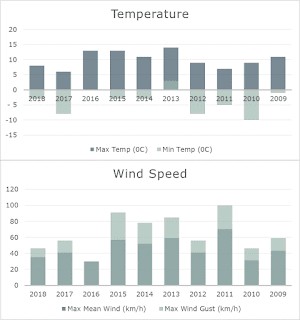December Weather Patterns
Do you remember the weather last December? Some of it wasn't pretty, such as Storm Deirdre. In case you have forgotten, the Met Office's report states the following impact:
And here are some contemporary reports:
As expected, there is quite a wide variation from year to year, with some years being relatively mild with temperatures generally above freezing while others had days when the temperature never exceeded zero degrees Celsius. One suspects the milder temperatures were accompanied by wetter weather but unfortunately the data has not been found. Three of the ten years had periods of extreme cold with temperatures below freezing all day on one or more days, and four years had severe gales (9 on the Beaufort Scale).
Freezing rain caused treacherous conditions and multiple traffic accidents, particularly on the M74 and across southern Scotland, and the A66 across the North Pennines was closed. There were further traffic incidents across parts of England and Wales, reports of fallen trees and several hundred homes without power across parts of Wales and Scotland. Planes had to abort landings at Manchester Airport due to strong crosswinds.
And here are some contemporary reports:
- https://www.theguardian.com/uk-news/2018/dec/15/storm-deirdre-batters-britain-snow-freezing-rain
- https://www.bbc.co.uk/news/uk-scotland-46574942
- https://www.theguardian.com/uk-news/2018/dec/16/storm-deirdre-set-to-ease-after-snow-and-gales-wreak-havoc
| Year | Max Temp (0C) | Min Temp (0C) | Max Mean Wind (km/h) | Max Wind Gust (km/h) | Days<=zero |
| 2018 | 8 | - 3 | 35 | 46 | 0 |
| 2017 | 6 | - 8 | 41 | 56 | 1 |
| 2016 | 13 | 0 | 30 | 30 | 0 |
| 2015 | 13 | - 3 | 57 | 91 | 0 |
| 2014 | 11 | - 3 | 52 | 78 | 0 |
| 2013 | 14 | 3 | 59 | 85 | 0 |
| 2012 | 9 | - 8 | 41 | 56 | 2 |
| 2011 | 7 | - 5 | 70 | 100 | 0 |
| 2010 | 9 | -10 | 31 | 46 | 3 |
| 2009 | 11 | - 1 | 43 | 59 | 0 |
As expected, there is quite a wide variation from year to year, with some years being relatively mild with temperatures generally above freezing while others had days when the temperature never exceeded zero degrees Celsius. One suspects the milder temperatures were accompanied by wetter weather but unfortunately the data has not been found. Three of the ten years had periods of extreme cold with temperatures below freezing all day on one or more days, and four years had severe gales (9 on the Beaufort Scale).
Further records of historical weather events from the Met Office include several December events.
- 2015 - Storm Desmond caused severe flooding in Cumbria and elsewhere, with major disruption to transport and power networks;
- 2013 - severe storms at the beginning of December leading to widespread damage, 100,000 homes without power and two fatalities, followed by a sequence of storms over the middle of the month and into January;
- 2011 - a period of turbulent weather with a particularly virulent storm on the 8th leaving 150,000 homes without power and an estimated £100m cost to Scotland's economy;
- 2010 - a full month of bitterly cold weather from the end of November to the end of December with thousands of schools closed due to snow and disruption to road, rail, power and water networks.
- 2009 - heavy snow and prolonged cold spell from mid December to mid January.
That is six of the past ten Decembers with documented severe weather events causing significant disruption. The inference from this is that their may be as high as a 50% chance of disruption to polling in at least some regions of the UK due to adverse weather on the days leading up to the election or the election day itself.
Only a fool would gamble on the weather but this information paints a picture of what could be expected on the 12th of December 2019, date of the 2019 General Election. The short hours of daylight have already been cited as a potentially causing lower voter turnout but this analysis of December weather patterns suggests this may also have a significant effect. According to the Electoral Commission, quoted in this extract from the Guardian's Politics live feed on 1/11/19, there can be no extension to voting to deal with such scenarios.
This is the first December General Election since 1923 with good reason. Let's see what then next six weeks bring, but, in the meantime, please consider a postal vote in advance (allowing for slower post times during the approach to Christmas).
This is the first December General Election since 1923 with good reason. Let's see what then next six weeks bring, but, in the meantime, please consider a postal vote in advance (allowing for slower post times during the approach to Christmas).


Comments
Post a Comment